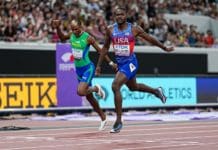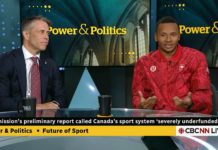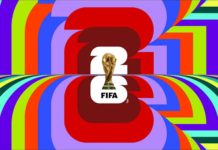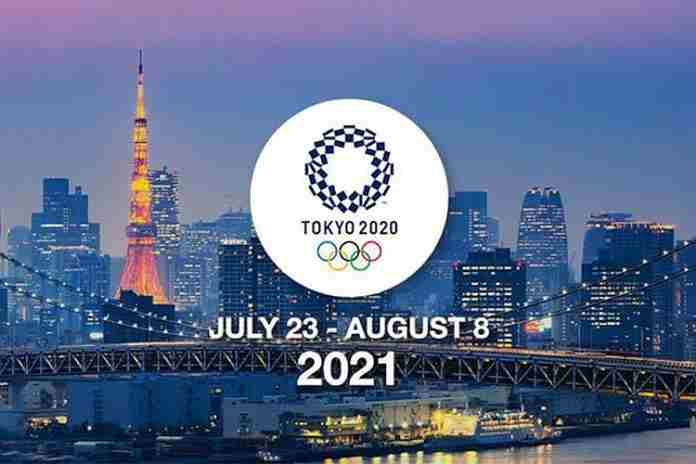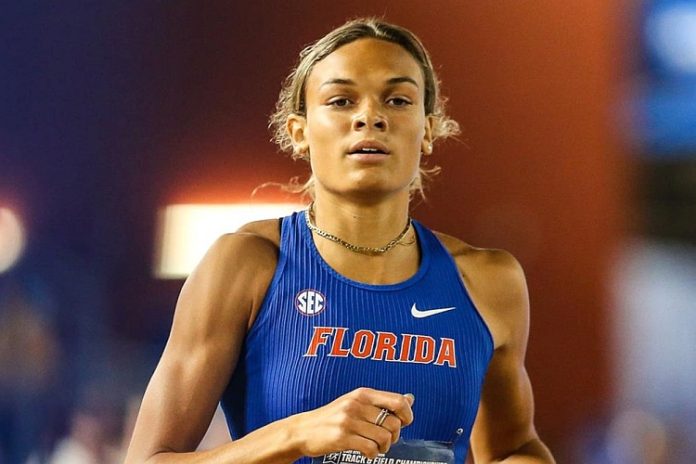(★ Friends: Your support makes this site possible. Please donate here if you would like to assist; thank you. ★)
● Plus: On Screen: Modest interest in NCAA Track, NYC Grand Prix on TV = International Federations: governance report shows improvement = Basketball: Griner hearing off to 2 July = Boxing: failure of aggressive new programs led to AIBA corruption; IBA board to consider new elections Friday = Weightlifting: Ajan and Vlad banned for life for doping violations ●
News, views and noise from the non-stop, worldwide circus of Olympic sport:
≡ SPOTLIGHT ≡
It cost a lot more than it was supposed to and a lot less than it could have.
The final cost of the Tokyo 2020 Games to be announced publicly was confirmed on Tuesday at ¥1,423.8 billion or approximately $10.431 billion U.S. (at current exchange rates), for the first-ever Games to be postponed.
At the final meeting of the Tokyo Organizing Committee, some of the details were revealed and the Official Report of the Games – first since London 2012 – was handed over to the International Olympic Committee. A review of the total Games cost budgets over time showed:
● 2013/Bid: $5.38 billion U.S.
● 2016/Dec.: $14.0 billion U.S.
● 2018/Dec.: $12.6 billion U.S.
● 2019/Dec.: $12.6 billion U.S.
● 2020/Dec.: $15.4 billion U.S.
● 2022/Jun.: $10.4 billion U.S.
Compared to the bid projection of ¥734 billion, the final total of ¥1.42 trillion was up by ¥690 billion, or 48.5%, and was a disaster. Compared with the ballooning costs forecast in 2020 and then due to the pandemic, it could have been much worse. (The IOC’s announced figures are different, using an old, agreed-on exchange rate.)
On the revenue side, the Japanese organizers set an all-time record of $3.4 billion in domestic sponsorship revenues, which accounted for 59% of its revenues of $5.8 billion. It also received $1.3 billion from the IOC, $500 million in insurance due to the Covid-19 delay and $600 million in licensing and other revenues.
Costs related to the pandemic were ¥38 billion ($278.2 million).
The division of costs for the Games included 44.9% for the organizers (¥640 billion), 41.9% (¥597 billion) for the Tokyo Metropolitan Government (including the new stadia) and 7.68% for the Japanese national government (¥187 billion).
≡ THE 5-RING CIRCUS ≡
● XXVI Olympic Winter Games: 2030 ● The Spanish bid for 2030 has ended and will be reformed into a bid for 2034 or beyond.
A plan for a Games to be held in the Aragon and Catalonia regions dissolved into unsolvable bickering between the two, with no resolution possible in time to make a credible bid against Sapporo (JPN), Salt Lake City (USA) or Vancouver (CAN).
This is good for the other cities, which are pressing ahead with detailed bids, especially in the case of Sapporo and Salt Lake City.
● International Federations ● The Association of Summer Olympic International Federations (ASOIF) published its fourth governance review, with 32 of 33 members meeting the minimum expected scores.
The goal was for the 27 full members to score 130/200 across the 50 indicators and 120/200 for the six associate members. All but one made it.
The top-scoring federations scored 175 or higher and included the federations for badminton, equestrian, football, cycling, table tennis, track & field and rugby. Another 10 scored from 150-170, and 12 between 130-149. The World Dance Sport Federation – an associate member – was the only one below 120.
All but one are publishing financial statements and 27 of the 33 had term limits on officials. Gender balance on boards of directors continued to increase, but slowly, with 18/33 having women comprising at least 25% of these bodies.
A clear observation is how small most of the federations are:
=> Employees: the 27 full-time members saw nine with less than 20, and nine with 20-49 – that’s 18/27 – then five with 50-119 and four with more than 120.
=> Finances: eight of the 27 full-time members had CHF 8 million or less in annual revenues, seven were from CHF 8-20 million, seven from CHF 20-50 million and five above CHF 50 million.
Small, indeed.
● U.S. Olympic & Paralympic Committee ● The long wait for the Commission on the State of the U.S. Olympics and Paralympics is just about over. Word has come that the Commission, co-chaired by former USOPC Athletes Advisory Council chair Han Xiao and University of Baltimore law professor Dionne Koller has its funding – requested at $2,078,860 in the FY2022 budget cycle with a 15-month timeline – approved.
The 16-member group was created by the Empowering Olympic, Paralympic and Amateur Athletes Act of 2020 and is designed to review all aspects of the organization and evaluate its effectiveness. At least one hearing will be held.
This may sound like the ultimate insiders conference, but there are many sharp agendas-in-waiting and possible fireworks ahead. At the core: how does the USOPC spend its money? Stay tuned.
● On Screen ● Some interest in track & field viewership over the last week or so:
=> 10 Jun.: 263,000 NCAA Champs on ESPN2 (men)
=> 11 Jun.: 603,000 NCAA Champs on ESPN (women)
=> 12 Jun.: 835,000 NYC Grand Prix on NBC
No other meets, or the FINA World Championships, drew an audience of 200,000 or more through last Sunday (19th); this would include the first two days of the NCAA Track & Field Championships from Eugene. .
The other Olympic-sport event to be mostly ignored was the USA at El Salvador 1-1 draw in a CONCACAF Nations League match on the 16th, which drew 394,000 on FS1.
NBA Finals games five and six both drew almost 14 million viewers each, on ABC.
● Basketball ● Double Olympic gold medalist Brittney Griner continues to languish in Russian detention and now will not have her case heard until 2 July at the earlier. She has been held since mid-February after customs officials found hashish oil in a vape cartridge she was carrying.
● Boxing ● “Corruption was allowed to creep in and take hold of the organisation because of the senior management’s excessive focus on finding investments for unrealistic ventures. Insufficient attention was paid to the administration of the sport and its officials. When those enterprises never materialised, the sport suffered a huge financial burden that nearly caused its collapse. The singular focus of management became finding funds to repay the loans and pay the staff. The combination of attrition and the lack of financial resources ultimately resulted in the organisation being left with a skeleton staff to run itself.”
That’s the central finding of the 114-page report by McLaren Global Sport Solutions, investigating the implosion of the AIBA, now re-named as the International Boxing Association.
The federation’s downfall was laid at the feet of former President C.K. Wu (TPE), elected in 2006 and only dismissed in an internal revolt in 2017. Wu created aggressive new boxing programs and a marketing arm and then, when they were failing, drove AIBA into debt to continue to support them. In short, “The market thought to exist for fans to watch franchised boxing bouts as outlined in the business plan was in fact illusory and highly optimistic.”
Some $39 million was borrowed in all, and the federation likely would have collapsed without the Gazprom sponsorship – a gift, really? – that Russian President Umar Kremlev arranged after election in late 2020.
Along with the financial issues came pressure for favors and competition manipulation in refereeing and judging. The report suggests multiple future fixes, including education about bout fixing, very strict access to the field of play, an independent integrity unit and so on.
The report did not believe the situation in boxing is irretrievable, but a culture change is mandatory.
¶
Last week’s decision by the Court of Arbitration for Sport, upholding the appeal against the IBA Extraordinary Congress election disqualification in May of Dutch Boxing President Boris van der Vorst also included candidates for the IBA Board, including Michael McAtee (USA), Steven Hartley (NZL) and Per-Axel Sjoholm (SWE):
“The CAS Arbitrator in charge of the matter found that the Appellants had committed only a minor breach of the regulations governing the IBA elections (early campaigning) which would have deserved a light sanction such as a warning or even no sanction, but not an exclusion from the election; furthermore, the Sole Arbitrator noted that the incumbent President had committed the same minor violation and had not been sanctioned for it.”
IBA chief Kremlev asked the federation Board to authorize new elections; the Board will meet on 24 June.
● Weightlifting ● Worth noting that in the decision of the Court of Arbitration for Sport last week against former International Weightlifting Federation President Tamas Ajan (HUN) and former long-time coach and official Nicu Vlad (ROM), both received the same penalty” lifetime bans.
For Ajan, his list of offenses included “tampering, which includes engaging in any fraudulent conduct to alter results or prevent normal procedure from occurring and complicity involving an anti-doping rule violation.” For Vlad, it was “only” the single charge of “complicity involving an anti-doping rule violation,” but it was the “seriousness of the ADRVs and the length of time over which they were committed” which made the sanction appropriate.
As the prosecutor of the cases, the International Testing Agency noted:
“The ITA was hampered by the depth and breadth of the IWF’s past years of inaction, which resulted into 29 unsanctioned doping violations being impossible to prosecute due to statute of limitation and/or destruction of evidence. The reasons why these cases were unprocessed and/or unsanctioned, ranged from mere administrative oversight, poor record keeping, chaotic organisational processes, or jurisdictional errors – on one end of the spectrum – to indifference, outright negligence, complicity, or – at worst – blatant and intentional cover-ups.”
You can receive our exclusive TSX Report by e-mail by clicking here. You can also refer a friend by clicking here, and can donate here to keep this site going.
For our updated, 620-event International Sports Calendar for 2022 and beyond, by date and by sport, click here!







